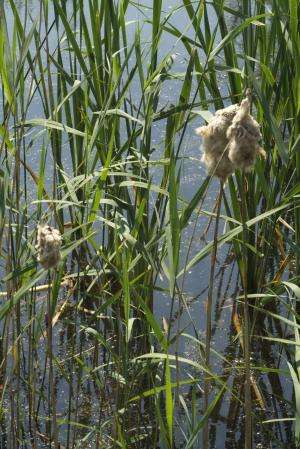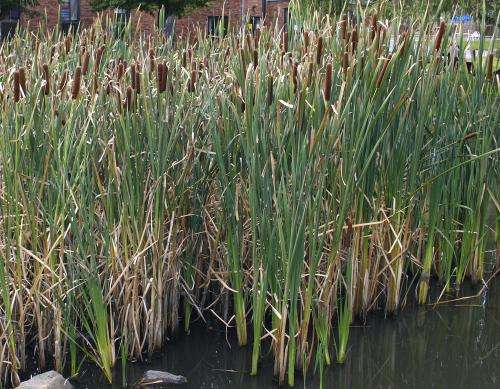Common weed revealed to diminish water pollution

Francisco Delgado Vargas, from the Autonomous University of Sinaloa (UAS), researches the use of the plant Typha domingensis in reducing bacterial contamination of water for agricultural use. This plant helps to reduce up to 98 percent of pollution by enterobacteria (usually found in the intestines of mammals) involved in the development of disease.
The plant is presented in places where water flows and withstands high pollution concentrations. "The roots of Typha domingensis are always flooded, absorbing nutrients from the soil and releasing compounds that help reduce the impact of pathogens," says the researcher.
The study, conducted in collaboration with the Helmholtz center in Germany, specializing in environmental research, and with support from the National Council of Science and Technology (CONACYT) in Mexico, has two approaches: to demonstrate that an agricultural drain is able to reduce the impact of biological and chemical contamination that can cause diseases to the population and even death, and evidence revealing which substances are polluting these channels.
Over a year, the Faculty of Chemical and Biological Sciences collected water, sediment and Typha dominguensis samples of a 3.6 kilometer-wide segment of the drain "La Michoacana" in the town of Navolato, Sinaloa, in the North East of Mexico.
The selected section receives water and solid waste from agriculture, livestock and the town located on the banks of the canal. "Site selection required the support of specialists of the National Water Commission (Conagua) and the Helmholtz Centre for Environmental Research, we toured the irrigation district 010 to choose the drain with the greater impact for the study," says Delgado Vargas.
In the analysis, 10 kinds of bacteria were found, mostly enterobacteria; however, two of them (Kluyvera and Hafnia) have not been reported in previous studies, which could mean a characteristic of the country or the locality.

The results of the decrease in chemical pollutants are being processed by the staff of the Helmholtz Centre in Leipzig, Germany.
Vargas Delgado indicates that mankind has an impact on the drains, "most pollution comes from fecal waste; this indicates that there is other bacteria that can affect health."
He adds that Typha domingensis is considered a pest in the drains, and is therefore removed; however, proper management helps the ecosystem. "We are invading the places where these plants develop, removing them, and don't see the great ecological benefits that they provide."

"Properly designing drains so that there is space for plants to help reduce pollution without affecting the free flow of water would allow the agricultural drains to play their role in the evacuation of excess water from the mainland and also lessen the impact of pollutants that are thrown into these channels."
The team of Delgado Vargas also analyzed fruits like papache (Randia echinocarpa), ayale (Crescentia alata), aguama (Bromelia pinguin), uvalama (Vitex mollis), nanche of the coast (Zizyphus sonorensis) and yellow (Byrsonima crassifolia),some of the most common plants in traditional medicine in Central America.
In the analysis of the fruit, researchers look for chemical compounds with anti-infectious biological activities that can help public health conditions such as diabetes. "For a megadiverse country like Mexico, knowledge and sustainable use of biodiversity is an obligation that benefits us all."
Provided by Investigación y Desarrollo


















